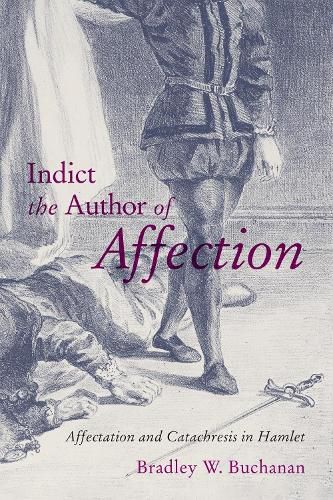Readings Newsletter
Become a Readings Member to make your shopping experience even easier.
Sign in or sign up for free!
You’re not far away from qualifying for FREE standard shipping within Australia
You’ve qualified for FREE standard shipping within Australia
The cart is loading…






Many scholars have touched tangentially on the topic of affectation in Hamlet, but none have yet offered an adequate rhetorical analysis of Shakespeare's treatment of the concept. Making the claim that affectation is an anomalous affective malady that afflicts nearly everyone in the play, Bradley Buchanan explores the many manifestations of affectation at the court of Elsinore in light of classical rhetorical theory, as well as in the broader context of early modern intellectual culture.
Buchanan shows that the special twist in Shakespeare's depictions of affectation lies in the catachrestic abuse of the older English word "affection" by Hamlet himself (among other characters) to signify the new, foreign concept of affectation. This disturbing conflation of two opposing conditions encapsulates Hamlet's much-discussed problem: he cannot tell the difference between genuine affection and deceptive affectation. Drawing on a growing field of scholarship engaged in the study of rhetoric in early modern English texts, Indict the Author of Affection explores how Shakespeare's extensive and self-conscious use of catachresis involves not only far-fetched metaphors but subversive new meanings that can infect familiar words, dramatizing his characters' psychological conflicts and producing a rich but treacherous instability in language itself.
Indict the Author of Affection brings to Hamlet a groundbreaking analysis engaged with the complex, wide-ranging, and contentious discourse concerning affectation as a rhetorical, moral, and aesthetic issue.
$9.00 standard shipping within Australia
FREE standard shipping within Australia for orders over $100.00
Express & International shipping calculated at checkout
Many scholars have touched tangentially on the topic of affectation in Hamlet, but none have yet offered an adequate rhetorical analysis of Shakespeare's treatment of the concept. Making the claim that affectation is an anomalous affective malady that afflicts nearly everyone in the play, Bradley Buchanan explores the many manifestations of affectation at the court of Elsinore in light of classical rhetorical theory, as well as in the broader context of early modern intellectual culture.
Buchanan shows that the special twist in Shakespeare's depictions of affectation lies in the catachrestic abuse of the older English word "affection" by Hamlet himself (among other characters) to signify the new, foreign concept of affectation. This disturbing conflation of two opposing conditions encapsulates Hamlet's much-discussed problem: he cannot tell the difference between genuine affection and deceptive affectation. Drawing on a growing field of scholarship engaged in the study of rhetoric in early modern English texts, Indict the Author of Affection explores how Shakespeare's extensive and self-conscious use of catachresis involves not only far-fetched metaphors but subversive new meanings that can infect familiar words, dramatizing his characters' psychological conflicts and producing a rich but treacherous instability in language itself.
Indict the Author of Affection brings to Hamlet a groundbreaking analysis engaged with the complex, wide-ranging, and contentious discourse concerning affectation as a rhetorical, moral, and aesthetic issue.